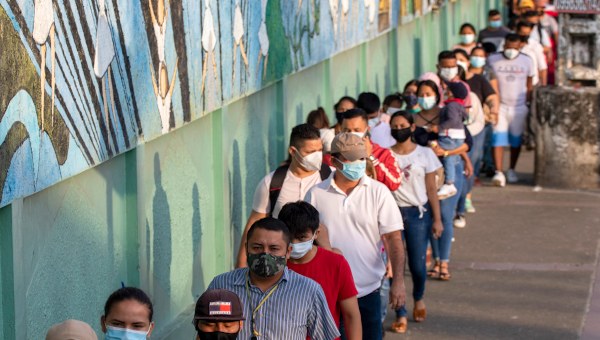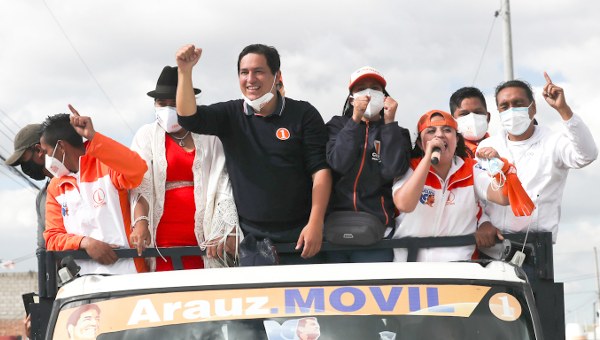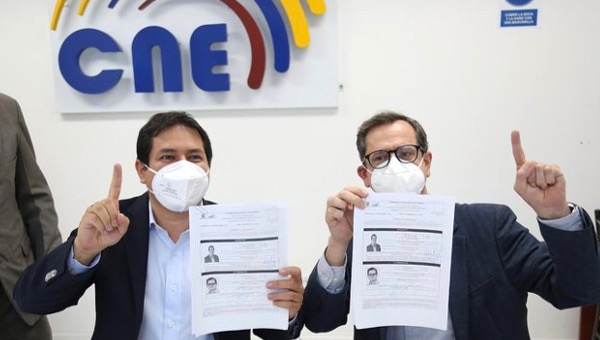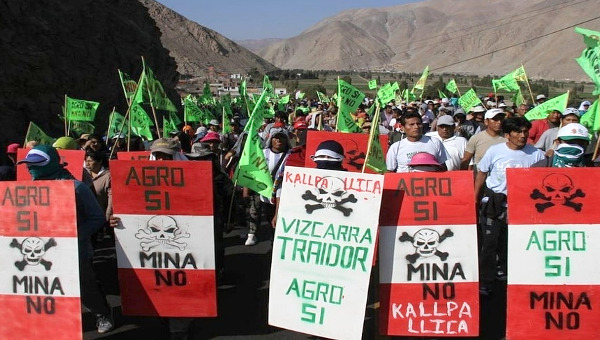Ecuador is Not For Sale
Corporations and their government enablers prefer to keep the ecocidal and ethnocidal reality of extractivism hidden, but activists in Ecuador are exposing the truth.
The Ecuadorian government, led by the administration of President Daniel Noboa, is forcefully and illegally pursuing mineral and fossil fuel extraction without democratic consent, tear-gassing peaceful protestors in full public view, and doing far worse to remote frontline communities. In the Andean Cotopaxi region, where Canadian firm Atico Mining plans to extract gold and copper at the expense of a key water source, repression has been intensifying.
Ecuadorian law requires mining corporations to consult with impacted communities before starting operations. But last month, when the Palo Quemado community in Cotopaxi attempted to exercise this right, police and the military responded like Atico Mining henchmen, attacking more than 100 people and labeling them terrorists. One person was hospitalized and remains in critical condition according to a spokesperson from Extinction Rebellion Ecuador.
Refusing to let this violence stand, activists with XR Ecuador and fellow members of an anti-mining coalition joined with indigenous groups for multiple solidarity actions in Quito in March, starting with a protest in front of the Canadian Embassy. Officials took note, as became apparent the next day.
Surrounded by press on a busy city street, police bombarded protesters and onlookers with teargas during a peaceful sit-in at the Ministry of the Environment. “Something like this, in front of the media and the public, hasn’t happened in a long time in the city,” said a member of Extinction Rebellion from Quito. Despite the police aggression, the protesters managed to stay calm, regrouped, and continued with their planned rally.
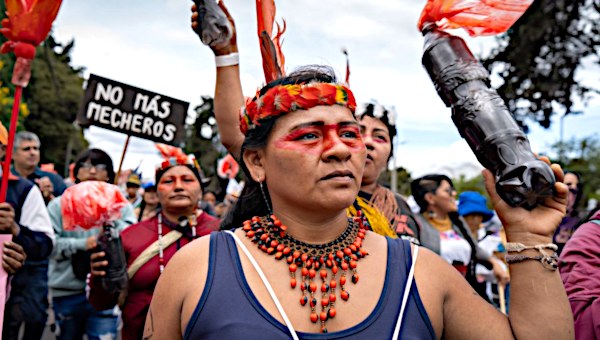
Stop the Gaslighting
Illegal mining isn’t Ecuadorian activists’ only ongoing struggle against extractivism. In a historic referendum in 2023, Ecuadorian citizens voted massively in favor of keeping over 726 million barrels of oil in the ground under the Amazonian Yasuní National Park. Celebrated as a climate victory around the world, the reality on the ground is that the battle to preserve this precious region, the most biodiverse in the world and home to two of the world’s last Indigenous communities living in voluntary isolation, is far from over.
To fund a crackdown against gang violence, Ecuador’s recently elected president Daniel Noboa has suggested a moratorium on the referendum, even though he vowed to protect the Yasuní when he was a presidential candidate. In a January interview to a local media outlet, Noboa said that he believed a “moratorium [to the referendum result regarding oil exploitation in the Yasuní] is a viable path.”
Pedro Bermeo is a spokesperson for YASunidos, a coalition of indigenous NGOs from the Amazon that led the call for the referendum. He recently told Climate Home News that Noboa’s statement is “worrying, unwise, and undemocratic” as Noboa is saying he won’t abide by people’s votes.
As someone who voted in favor to keep Yasuní’s oil underground, Bermeo said that people like him feel their “hope is being taken away.” When the referendum took place, Ecuador was already facing extreme violence and poverty. But nevertheless, people voted to keep the oil in the ground. “There was a feeling of hope to protect life on the planet,” says the activist. Bermeo argues that voters feel defrauded and “have stopped believing in the State.”
Belén Páez, president of climate and indigenous rights NGO Fundación Pachamama, said Noboa’s statement “is very dangerous in several ways because it attempts against the citizens’ decision and puts democracy at risk.” Páez, who has worked to protect indigenous rights in Ecuador, added that Noboa’s remarks could result in a set back of other environmental policies.
On February 1, the indigenous Amazon Waorani Nationality declared themselves in a ‘territorial emergency’ and demanded that the government respect the referendum and announced that, if a moratorium is formally proposed, they will take legal action against the Ecuadorian State. Their decision to do so was supported by the Confederation of Indigenous Nationalities of the Ecuadorian Amazon. “We are not going to allow our rights to continue being violated,” said Waoranai Nationality president Juan Bay, “it is time for us to have social and environmental justice.”
Since his remarks in January, president Noboa hasn’t referred to the moratorium again. But government insiders say that it is still a possibility.
Petroecuador, the state oil company, has actually ramped up extraction since the referendum, reaching a new peak production in 2023 in an attempt to extract as much oil as possible before the referendum can be enforced. In Yasuní alone, Petroecuador operates more than 400 gas flares, many beside the houses of indigenous people. The flares cause cancer, decimate biodiversity, and emit more than 100 million tons of greenhouse gasses each year.
A successful lawsuit against the government to remove the flares was filed by Las Nueve Niñas, a group of young women from Yasuní. Yet three years later, the flares are still there, and the government is trying to wriggle free of the court’s order.
On March 12, UDAPT, an anti-extractivist NGO co-organized a march through Quito with XR Ecuador, joined by Las Nueve Niñas and 300 more activists, to demand compliance with the court. The coalition then followed up with a sit-in at the national court. More actions are planned for May and June to pressure the government to stay true to its word, follow its own laws, and accept that Ecuador is not for sale.
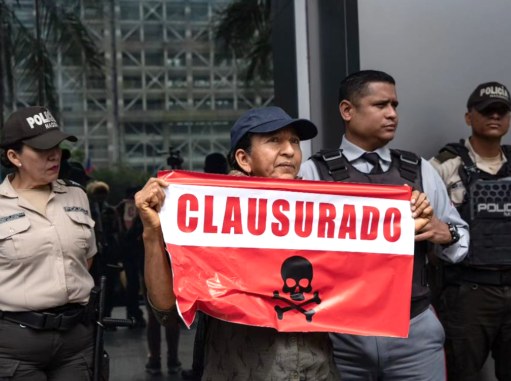
Leave it in the Ground
The idea that Ecuador should forgo extracting some of its oil in exchange for international financial support from wealthy countries had been more than 17 years in the making – first raised in 2006 by the economist and incoming Minister of Energy and Mines, Alberto Acosta. The plan would also have kept an estimated 410 million tons of CO2 – the major greenhouse gas driving climate change – from reaching the atmosphere.
Acosta’s proposal was embraced by the newly elected president Rafael Correa. The following year, Correa announced at the United Nations that Ecuador was seeking to raise funding commensurate to half of the value of 846 million barrels of unexploited oil the Ishpingo, Tambococha and Tiputini (ITT) oil fields in Yasuní. The plan was scrapped six years later when less than 10 percent of the target figure was raised. In 2013, Correa declared that Ecuador would move forward with operations in the ITT oil fields, proclaiming that, “The world has failed us.”
The government folded under the immense pressure of development debt and the predatory global financial architecture upon which extractive capitalism vampirizes the global south. Correa was not wrong in his assessment that the world had failed Ecuador, and in fact it was poised to steamroll the people’s consensus to reject ecocide and ethnocide in exchange for lining a few pockets with petrodollars.
In the months that followed, the Correa administration advanced oil operations within the ITT via two separate legal manipulations. First, he asked the Ecuadorian congress to declare that these operations were in the “national interest,” a constitutional prerequisite for drilling inside a national park. Ecuador’s constitution also prohibits “all forms of extractive activities” on the territories of peoples living in voluntary isolation. In a bureaucratic maneuver to circumvent these protections for indigenous communities, his administration changed official maps that had shown the presence of isolated family groups living in and around the ITT oil fields.
Activists and affected communities, however, did not cave. In August 2013, YASunidos launched a campaign to gather enough signatures to force a nationwide referendum on the question of whether Ecuador should leave the oil under the ITT fields in the ground in perpetuity. By 2015, the activists amassed over 750,000 signatures, the majority of which were invalidated by the Correa administration. Nearly a decade and multiple legal battles later, Ecuador’s constitutional court ruled in 2023 that YASunidos had enough valid signatures to force the referendum. Sadly, during that long period of litigation, the government had forged ahead with operations inside the ITT fields, which began producing oil in 2016.
The people of Ecuador have repeatedly made themselves clear through resistance in the streets, in the courts, and by voting for life – both for the rights of nature and for the Indigenous people living in places like Yasuní and Cotopaxi. In 2008, Ecuador became the first country to recognize the rights of nature in its constitution, building to the outcome of the 2023 referendum as the nation’s affirmation of the recognition that nature and all its constituent parts have inherent rights to life and wellbeing. In this paradigm, humans are a part of nature.
Trickle-Down Tricks
Natalia Greene, a political scientist, founding member of YASunidos, and executive committee member of the Global Alliance for the Rights of Nature, rejects the implication made by Petroecuador and pro-oil groups that oil extraction is needed to alleviate poverty in Ecuador.
“We’ve had 50 years of oil exploitation and we’re still a very poor country,” she said. “Exploitation of nonrenewable resources has a structure where few people and foreign companies win a lot of money, a few people get poor-paying jobs and our resources are exported. The social and environmental costs are never taken into account.”
Activists are pointing out rising inequality as a result of neoliberalism and neocolonial economic relations and are promoting alternative solutions for ending both poverty and extractivism. According to YASunidos, the income of the 110 largest companies in Ecuador represent 62% of the entire GDP. However, year after year the percentage of income taxes they pay continues to decrease while their profits increase. This trend is accentuated with the 20 largest companies.
Reversing the trend of reducing the tax burden for the ultra rich is one way that activists propose to finance improved social welfare while leaving fossil fuels and other resources in the ground – and the numbers are impressive. If the corporate tax rate was increased by just 1.5%, more money would be raised than by the planned exploitation of the Yasuní. That is, in 25 years, more than $20-billion would be generated, which would more than offset the $18-billion that could be extracted from the natural reserve. These numbers do not even account for the many economic assets of Yasuní beyond oil. Destroying this ecosystem and the communities who have made it their home for millennia is simply a bad investment.
Ecuadorians have learned from experience that the trickle-down economics promised by extractivist corporations and state enablers is a myth, yet the destruction it leaves behind is painfully real. Between 2007 and 2013, oil revenues of $51.5-billion were generated – much more than the $18-billion that could supposedly be obtained from the ITT fields of Yasuní. However, even with this influx of cash, Ecuador was not able to overcome poverty and debt.
It is empirically untrue when it is claimed that continued mass extraction will end Ecuador’s miseries, as is currently being argued by the Noboa administration as well as fossil fuel and mining corporations. Equivalent money can be generated by other means without ecocide and ethnocide, without violating the Rights of Nature (inclusive of humans) in Yasuní, Cotopaxi, and elsewhere.
All Out for Transformation
The Constitution of Ecuador, in its article 317, declares that the State “will prioritize intergenerational responsibility, the conservation of nature (…) and will minimize negative environmental, cultural, social and economic impacts.” While these are beautiful words, this is not something that can be achieved in a vacuum, let alone the hostile, predatory vacuum of neocolonial extractivism. The governments of the world have failed to provide an efficient, coherent and organized response to climate change, hence the climate and ecological emergency continues to worsen; a fact that will affect the younger generations even more.
In a statement given on the long standing and growing coalition of anti-extractivist organizations and communities, YASunidos explains:
“We are a diverse and inclusive group of groups, we are people organized in defense of life in all its manifestations and forms, we seek active participation in the decision-making of our country and the world to determine our daily life and our future.
“We start from a reality of environmental devastation and climate change, the product of an ideology that has put its efforts and expectations in the promises of a capitalist and anthropocentric society where life is nothing more than a commodity.
“We want to transform our relationships with nature and other animals, in order to stop the history of destruction and death.”
As they prepare for ongoing struggle and brace for increasing repression from the current “business friendly” Noboa administration, activists in Ecuador are an example to the world – a world which must finally stop failing them by joining in solidarity against extractivism and for just alternatives.
This fight is a long-distance race, another lesson from struggle in Ecuador, but that doesn’t mean there is time to waste. “Join the movement,” says YASunidos. “We need to inform ourselves. Discuss alternatives. Share them. Get organized. Join collective actions in your community.” •
Originally published by ZNetwork.org under a Creative Commons Attribution-NonCommercial 4.0 International License.


